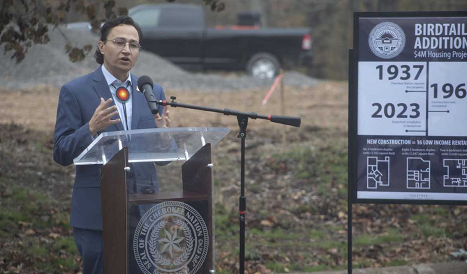
- Details
- By Chuck Hoskin Jr
Guest Opinion. For those of us who have never faced not having a secure place to live, it can be easy to take that basic necessity for granted. The Cherokee Nation does not take it for granted, because we know that too many families still struggle with getting a safe and affordable home. We have made this a major priority across the Cherokee Nation Reservation, with multiple initiatives to ensure Cherokee families have an affordable place to live and thrive.
The latest project to break ground is a $4 million investment in affordable duplexes, just across the road from our world-class Cherokee Nation Health Outpatient Clinic in Tahlequah. The new development, with 16 units in total, will replace housing that was built in 1969. This is one in a long line of projects funded by the Housing, Jobs and Sustainable Communities Act (HJSCA) of 2019. Deputy Chief Bryan Warner and I, working with the Council of the Cherokee Nation, created this legislation to build homes, replace aging homes and create more homeownership opportunities for Cherokees.
To date, we have built or repaired hundreds of Cherokee homes under HJSCA, and we are planning many more in 2023. Future announcements will include one-bedroom elder units in Stilwell, single family units in Locust Grove, duplexes in Sallisaw and elder units in Marble City. We also recently put 34 acres of land across five communities in northeast Oklahoma into the hand of the Housing Authority of the Cherokee Nation to build new homes. The $120 million investment provided through HJSCA also enables us to upgrade rental housing across the reservation.
These projects are being designed with whole communities in mind. A great example is our collaboration with Jay Public Schools, which donated 10 acres of school property to build about 20 affordable homes for Cherokee families. Jay Schools donated the land to the Housing Authority of the Cherokee Nation, and in turn, Cherokee Nation will build new homes starting next year. Plans also include the construction of a community center and outdoor recreation space on the donated acreage.
The Cherokee families who will one day own these houses all have children attending Jay Public Schools. This partnership helps our citizens and the school district as well, because donating the land to a tribe means the school can receive federal impact aid dollars that will go towards brightening our children's future. The school will also be able to use the community center and outdoor recreation space, which benefits every student in the district.
Additionally, Cherokee Nation will assist in modernizing the community’s wastewater system and make other improvements, such as helping fund a pavilion. Better homes, better schools and stronger communities mean more of our youth will stay in our small towns and rural areas, help care for our elders and grow our tribal nation.
The project in Jay is similar to our partnership with Vinita Public Schools in 2019 to build new homes for Cherokees. Both are enabled by a 2018 Oklahoma law, authored and championed by Cherokee state-elected officials, that allows schools to transfer property to a housing authority for housing development. The result is a win-win for the school, families with children and the whole community.
A good government makes life better for its people and for future generations. What we spend on housing today is a long-term investment in Cherokee families. I am confident that when we invest in Cherokee families it will always pay off. I am proud of what we have done in 2022 to create more homeownership for our people and excited about what we will accomplish in the coming year.
Chuck Hoskin, Jr. is the principal chief of the Cherokee Nation.
More Stories Like This
The SAVE America Act Threatens Native Voting Rights — We Must Fight BackThe Presidential Election of 1789
Cherokee Nation: Telling the Full Story During Black History Month
Jesse Jackson Changed Politics for the Better
Native News Online at 15: Humble Beginnings, Unwavering Mission
Help us defend tribal sovereignty.
At Native News Online, our mission is rooted in telling the stories that strengthen sovereignty and uplift Indigenous voices — not just at year’s end, but every single day.
Because of your generosity last year, we were able to keep our reporters on the ground in tribal communities, at national gatherings and in the halls of Congress — covering the issues that matter most to Indian Country: sovereignty, culture, education, health and economic opportunity.
That support sustained us through a tough year in 2025. Now, as we look to the year ahead, we need your help right now to ensure warrior journalism remains strong — reporting that defends tribal sovereignty, amplifies Native truth, and holds power accountable.
 The stakes couldn't be higher. Your support keeps Native voices heard, Native stories told and Native sovereignty defended.
The stakes couldn't be higher. Your support keeps Native voices heard, Native stories told and Native sovereignty defended.
Stand with Warrior Journalism today.
Levi Rickert (Potawatomi), Editor & Publisher
